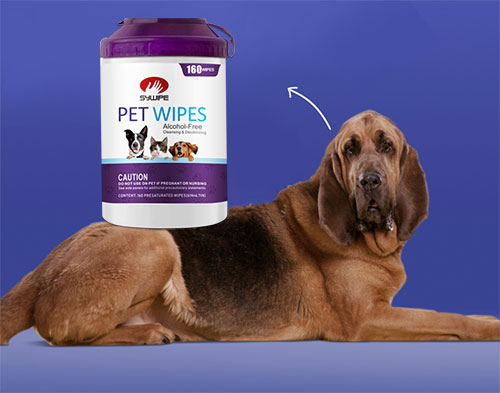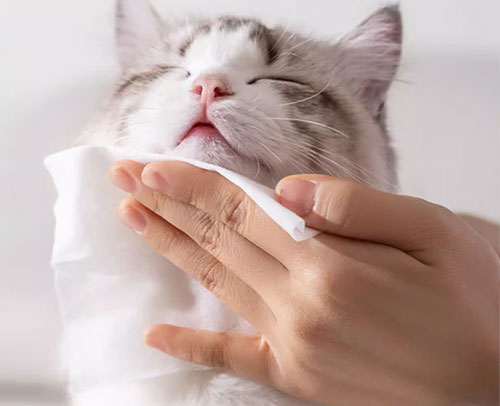+86-18927501869
- All
- Product Name
- Product Keyword
- Product Model
- Product Summary
- Product Description
- Multi Field Search
 English
EnglishViews: 1662 Author: Site Editor Publish Time: 2025-03-02 Origin: Site

As a pet parent, you understand that muddy paws, tear stains, and post-adventure messes are part of life. However, with increasing concerns about harsh chemicals and their environmental impact, dog wipes have transitioned from a mere convenience to a necessity. In this article, we will explore specialized categories such as dog ear wipes and antifungal wipes for dogs, share veterinarian-recommended routines, and uncover greenwashing traps—empowering you to care for your pup's paws, teeth, and more with confidence. With so many options available, how can you determine which dog wipes are safe and effective? We will explore everything you need to know about selecting the best dog grooming wipes for your cherished pets. Click here to learn more about the company.
Over 60% of commercial dog wipes contain ingredients linked to skin irritation, according to a 2023 study in Journal of Veterinary Science. Common offenders include:
• Alcohol (dries skin, disrupts natural oils)
• Parabens (hormone disruptors)
• Artificial fragrances (trigger allergies in 1 in 4 dogs)
• pH-balanced formulas: Dog skin has a pH of 6.2–7.4 vs. human 5.5 (AVMA data). Quality wipes match this range.
• Targeted cleansing: Look for enzymes that break down odor-causing bacteria (e.g., protease in Earth Rated wipes).
• Eco-design: Biodegradable materials like bamboo fiber decompose 90% faster than polyester blends.
While some brands market baby wipes as pet-safe, key distinctions matter:
| Feature | Dog Wipes | Baby Wipes |
| pH Level | 6.2–7.4 | 5.5–6.5 (too acidic for dogs) |
| Texture | Reinforced for thick fur | Ultra-soft for delicate skin |
| Active | Ingredients Odor-neutralizing enzymes | Milk proteins for diaper rash |
Let's hear from some real pet owners who have tried different dog grooming wipes:
“Using baby wipes gave my Lab a rash. Switching to pH-specific dog grooming wipes cleared it up in a week.” – Jake T., Seattle
"I used to struggle with keeping my dog's paws clean after walks, but these dog paw wipes have been a game-changer. They're gentle and effective, and my dog doesn't seem to mind them at all."–Sarah
"With both dogs and cats, I need wipes that are safe for everyone. These pet grooming wipes are versatile and gentle, making them perfect for my whole furry.” –Emily

Pet grooming wipes are more than just a quick fix—they're a convenient and gentle way to keep your dog or cat clean without the hassle of a full bath. Imagine trying to bathe your energetic pup or finicky cat every time they get a little dirty. Sounds like a nightmare, right? That's where dog wipes come in. They're perfect for wiping paws after walks, cleaning dirty fur, and even freshening up your pet's face. Whether you're on the go, dealing with an emergency, or just need a quick touch-up between baths, dog grooming wipes offer a hassle-free solution.
• Convenient for Quick Clean-Ups: No need for a full bath or even water. Just grab a wipe and go!
• Gentle on Skin: Look for wipes that are specially formulated to be mild and non-irritating. Your pet's sensitive skin will thank you.
• Portable and Easy to Use: Perfect for travel, emergencies, or just keeping your pet fresh on the go.
• Helps Prevent Allergies: Regular cleaning with dog wipes can reduce allergens and irritants that might cause discomfort.
• Look for ECARF Seal or NASC Quality Mark.
• Avoid methylisothiazolinone (MI)—a top contact allergen (VDIC 2024 report).
• Aloe vera: Soothes hotspots (proven 23% faster healing vs. plain wipes).
• Chlorhexidine: Vet-recommended for infection-prone areas (0.05% concentration).
• 100% compostable: Meet ASTM D6400 standards (breaks down in 84 days).
• Refillable packaging: Brands like Pogi's reduce plastic waste by 70%.
• Paw & pad wipes: Extra grip texture with natural deodorizers (e.g., rosemary extract).
• Eye area wipes: Rounded edges + saline solution to prevent stinging.
• NSF-certified manufacturing facilities.
• Responsibly sourced plant fibers (FSC-certified wood pulp or organic cotton).
Not all dog wipes are created equal. In fact, using the wrong type of wipes can have serious consequences for your pet's health. Many conventional wipes contain harsh chemicals, artificial fragrances, or alcohol that can irritate your pet's sensitive skin. Some dog wipes are even designed for humans and contain ingredients that can be toxic to pets if ingested or absorbed through their skin. It's crucial to always check the label and use dog wipes that are specifically designed for pets to avoid these risks.
• Skin Irritation: Harsh chemicals can cause rashes, redness, or itching.
• Allergic Reactions: Pets may react to fragrances or other additives.
• Toxicity: Some wipes contain toxic ingredients like phenols or parabens, which can be harmful if ingested.
With so many types of dog grooming wipes available, it's important to choose the right one for your pet's specific needs. Here are some of the most common types:
• Dog Paw Wipes: These are specifically formulated to clean your pet's paws after walks, helping to remove dirt, mud, and allergens.
• Dog Grooming Wipes: These can be used for general cleaning, including wiping down your pet's body, face, and coat.
• Cat Ear Wipes: Specially designed to clean your pet's ears and prevent infections.
• Tear Stain Wipes: Target the area around your pet's eyes to remove tear stains and debris.
When choosing a dog wipe, consider your pet's specific needs. For example, if your dog has sensitive skin, look for hypoallergenic wipes. If you have a cat, make sure the wipes are safe for feline use.

When selecting dog wipes, it's essential to look for gentle and non-toxic ingredients. Here are some key ingredients to keep an eye out for:
• Aloe Vera: Known for its soothing and moisturizing properties, aloe vera is perfect for calming skin irritations.
• Chamomile: A natural anti-inflammatory, chamomile helps to soothe your pet's skin and relieve itching.
• Vitamin E: Known for its skin-healing properties, vitamin E helps to nourish and protect the skin.
• Natural Oils (e.g., Coconut Oil): Provides moisture and helps to maintain the natural oils in your pet's skin and coat.
These ingredients not only ensure that the wipes are effective at cleaning but also safe for your pet's skin.

Now that you know what to look for, here are some of the top dog grooming wipes available on the market for 2025, known for their safety and effectiveness:
• Petkin Pet Wipes: These wipes are gentle, biodegradable, and come in various options for different needs.
• Pogi's Pet Supplies Wipes: Hypoallergenic and free from harsh chemicals, these wipes are great for cleaning your pet's paws, ears, and coat.
• Vet's Best Wipes: A trusted brand, these wipes contain aloe and chamomile to soothe the skin while cleaning effectively.
Using dog wipes is simple, but there are some precautions you should take:
• Start with Clean Hands: Wash your hands before and after using wipes on your pet.
• Wipe in the Direction of Hair Growth: Always wipe in the direction of your pet's fur to avoid irritation.
• Avoid Sensitive Areas: Be cautious around your pet's eyes and genital area. Use specialized wipes for those areas.
While dog wipes are convenient, they aren't the only solution for pet grooming. You can also use:
• Dry Shampoos: These are perfect for pets who are not fond of water.
• Pet Bath Sprays: Use them for a quick refresh between baths.
• Regular Grooming: Regular brushing and combing are essential to maintain your pet's coat health.
While it might be tempting to grab a pack of bamboo baby wipes for your pet, it's not a good idea. Here's why:
• Different pH Levels: Cats and dogs have a different skin pH than humans. While baby wipes are designed to be gentle on a baby's skin, they might not be pH-balanced for a pet's skin, potentially leading to irritation or dryness.
• Chemicals & Fragrances: Many baby wipes contain chemicals or fragrances to give them a pleasant smell or enhance their cleaning capability. These substances can irritate a cat's skin or, if ingested during grooming, lead to internal issues.
• Ingestion Concerns: Cats are notorious groomers. If you use a baby wipe on them, there's a high chance they might ingest any residues left behind when they lick their fur. Some ingredients in baby wipes, even if they're harmless for external human use, can be toxic when ingested by cats.
• Residue: Unlike wipes designed for pets, baby wipes might leave a residue on a cat's fur, which can lead to skin issues or potential ingestion of harmful substances.
• Alcohol Content: Some baby wipes contain alcohol, which can dry out a cat's skin and may lead to irritation or other skin issues.
If you're keen on using wipes for your cat or dog, it's best to invest in pet-specific wipes. These are specially formulated to cater to the unique needs of pets. They're typically free from harmful chemicals, are pH-balanced for pet skin, and often contain added benefits like conditioners or detanglers suitable for fur.

Homemade solutions for pet care have garnered increasing attention. Not only do they offer transparency in ingredients, but they also allow for customization based on the specific needs of individual pets. Here's a guide on how to create your own safe dog wipes:
• Full Control: You're aware of every ingredient that goes into your pet wipes, ensuring no harmful chemicals touch your pet's skin.
• Cost-Effective: Making your own wipes can often be more economical in the long run compared to purchasing commercial products.
• Customization: Whether your pet has allergies, specific irritants, or skin conditions, you can tailor your DIY solution to address these concerns.
Dog Wipes Ingredients and Their Benefits
• Distilled Water: It serves as a clean base. Using distilled water ensures there are no unwanted minerals or chemicals that might be present in tap water.
• Pet-Friendly Soap: A mild cleanser that can help remove dirt and debris. Ensure the soap is free of fragrances and harsh detergents.
• Coconut Oil: This natural oil acts as a moisturizer and offers antibacterial properties. It helps nourish the skin and leaves a protective barrier.
• Preparing the Solution: In a bowl, mix 2 cups of distilled water, a tablespoon of pet-friendly soap, and two tablespoons of coconut oil. Stir until they are well combined.
• Choosing the Fabric: Opt for a soft, durable fabric. Old cotton shirts, if clean, can be cut into squares and used as the wipe base.
• Soaking: Place the fabric squares in a clean container and pour the prepared solution over them, ensuring each piece is thoroughly soaked.
• Storage: Store in a sealed container to maintain moisture. It’s advisable to make small batches and use them within a week to ensure freshness.
• Add Aloe Vera: For extra soothing properties, especially beneficial for pets with irritated skin.
• Lavender or Chamomile: A few drops of these essential oils can offer calming properties, but ensure they're used in moderation and are of high quality.
• Regular Refresh: Since these dog wipes lack preservatives, it's good practice to create fresh batches regularly and store them in the refrigerator to prolong their shelf life.

Using cleaning wipes for cats and dogs isn't merely about swiping them down; it's a process that requires attentiveness and knowledge about your pet's anatomy and behavior. Here are some comprehensive tips to ensure you're maximizing the benefits while minimizing any potential risks:
• Paws: Given that these are in constant contact with the ground, they accumulate the most dirt. Additionally, substances like road salts or allergens can lodge between the toes, causing irritation.
• Underbellies: The area that often brushes against grass, dirt, or allergens. Especially for dogs that enjoy a good roll in the grass or cats that sprawl on various surfaces.
• Rear Area: Ensuring this area is clean can prevent infections and rashes. Remember, however, to be gentle and ensure dog grooming wipes used here are especially mild.
• Gentle Strokes: Avoid rubbing vigorously. Instead, use gentle, long strokes, which can be soothing for your pet and ensure efficient cleaning.
• Check the Fur Direction: Especially for long-haired breeds, always wipe in the direction of fur growth to prevent tangling.
• Frequency: Over-wiping, especially with products that have cleaning agents, can strip natural oils from your pet's skin. Use as needed, but don't overdo it.
• Watch for Allergies: Redness, excessive scratching, or discomfort after using cleaning wipes for cats and dogs may indicate an allergic reaction.
• Behavioral Changes: If your pet starts acting distressed, licking or biting excessively at cleaned areas, it might be an indication of irritation.
Pet grooming wipes are a fantastic tool for keeping your dog or cat clean between baths. However, it's essential to choose the right wipes that are safe and gentle. Always read the label, choose wipes that suit your pet's needs, and avoid harmful chemicals. By following these guidelines, you can ensure that your pet stays clean and happy without risking their health.
Final Thoughts
At Sywipe, we're committed to providing the best pet care solutions. Our dog grooming wipes are designed with your pet's health and comfort in mind. Whether you're looking for paw wipes, general grooming wipes, or specialized solutions, we've got you covered. Check out our range of products and see the difference for yourself.
A: For 85% of dogs, yes for 2–3 weeks between baths (per AKC guidelines). Avoid over-wiping paws/face.
A: Only if certified by INDA/EDANA flushability standards. Most clog pipes—opt for compostable.
A: Preservative efficacy drops after 2 years. Discard if smell/texture changes.
Sywipe seizes every opportunity to use high-quality resources, including peer-reviewed research, to support the facts in our articles. Learn more about wet wipes factories and how to keep content accurate, reliable, and trustworthy.
• How to Use Pet Wipes for Clean Dogs and Cats?
• The 13 Best Safe Dogs Wipes of 2025
• Discover the Cutting-Edge Solutions of Pet Wipes Manufacturers
Our Customers Always Come First
Trust is the Foundation of Our Service
sales@clean-wipe.com
sywipe@clean-wipe.com
Room 4611, No. 372 Huanshi East Road, Yuexiu District, Guangzhou,China.
+86-18927501869 / +86-20-81608597
/ +86-18927501869